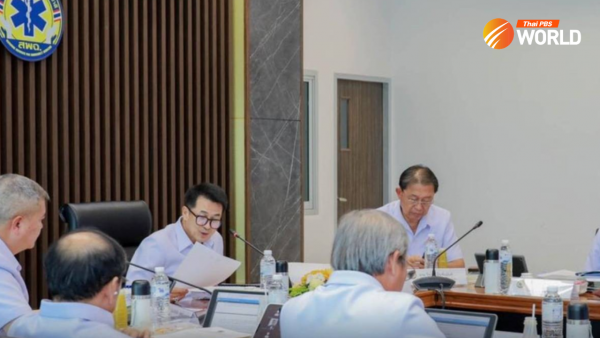Prayut faces tough task of replacing ‘Four Boys’ economics team

Uncertainty hangs over the fate of the “Four Boys” – the quartet of technocrats who run Thailand’s economy – as upheaval in the core coalition party signals a pending Cabinet shakeup. An even bigger question, though, is whether Prime Minister Prayut Chan-o-cha will be able to find suitable replacements if they do go.
The Four Boys – Finance Minister Uttama Savanayana, Energy Minister Sontirat Sontijirawong, Higher Education, Science and Innovations Minister Suvit Maesincee, and Kobsak Pootrakool, the PM’s deputy secretary-general for political affairs – were last month ousted from Palang Pracharath’s executive board, triggering speculation they will also lose their Cabinet seats.
Their performance may not be outstanding but some of their initiatives have impressed economists and political analysts, who say that if the Four Boys are removed from Cabinet, Prayut will need to find replacements who can earn the public’s trust and confidence.
Anusorn Tamajai, an economist at Rangsit University’s Faculty of Economics, said if its economic team has to be replaced, the government must first find a new team leader whose honesty is unquestioned – in the mould of former central bank governor Dr Puey Ungpakorn or late statesman Pridi Banomyong.
He said that the new economics tsar must also be highly capable and experienced, and command the respect of coalition parties – qualities necessary for the person in charge of a massive national budget that will be used to resurrect the economy after COVID-19.
Also imperative is that the new economic team have no political ambitions, as any concern over their public popularity could make them indecisive, the economist said.
“If they are not concerned about their popularity, they are free to formulate policies based on principles, research, scientific information and big data,” he added.
While the four technocrats received an outpouring of public support after they were ousted as party execs, government spokesperson Narumon Pinyosinwat – who was reportedly being groomed to lead the government’s economic team – was subjected to ridicule as critics questioned her credentials.
Meanwhile, though Prayut remains tight-lipped about a Cabinet reshuffle, a recent poll showed that nearly half of the respondents want the entire Cabinet changed.
Published by the National Institute of Development Administration (NIDA) on Sunday (July 5), the survey found that most respondents saw Uttama and Sontirat as unimpressive and want them to be left out of the Cabinet, though they want Suvit to stay put.
Anusorn, however, believes the incumbent economic team should not be ousted unless better replacements can be found, in terms of ability, honesty and boosting public and investor confidence.
“Making a change in the middle of the severest crisis in decades would be a huge disruption, which would only make things worse,” the economist said.
Wanwichit Boonprong, a political scientist at Rangsit University, said that Prayut is likely to let Uttama and Sontirat hold onto the Finance and Energy portfolios, but under the prime minister’s quota so they cannot be ousted by Palang Pracharath politicians.
The analyst cited two reasons. Firstly, qualified candidates will be wary of taking the portfolios for fear of becoming political victims like their predecessors. Secondly, Prayut has never betrayed party colleagues, especially Uttama and Sontirat, who stepped up to lead Palang Pracharath at a time when nobody wanted the job.
“Prayut is not the kind of person who ‘kills the warlord after the battle is finished’,” he added.
Far too much politics
Economists agreed that neither of Prayut’s governments have been successful in reforming the economy, since political obstacles have got in the way.
Anusorn said there were some initiatives, and strategies under the economic team were drafted, but there was a lack of participation. Also, the plans were too bureaucratic, showed fear of “thinking out of the box”, and failed to address the structural problems, he said.
However, the problem lay not with the economic team, but with the political system and national administration. Also, he said, all public and economic policies were limited by the current Constitution.
“In fact, this government doesn’t really have an economic team, as such, because it is a coalition composed of 22 political parties, who are trying to tackle problems under the limitations posed by the current charter,” Anusorn said.
Nada Chunsom, an economic lecturer at the Graduate School of Development Economics, NIDA, said both of Prayut’s governments focused only on short-term stimulus measures and failed to address the country’s deeper economic problems.
After Thailand was hit by COVID-19 in late January, the government launched stimulus packages of cash handouts to inject liquidity into the economy.
“However, these measures aren’t enough [to tackle the problem]. They just delay the damage and cushion the impact of COVID-19 on the Thai economy. I still don’t see any real effects of the economic stimulus,” the economist said.
Political analyst Wanwichit, meanwhile, gives the Four Boys 7.5 out of 10 for their performance because they were facing many difficulties.
Also, they faced the huge task of restoring the economy amid the deadly coronavirus outbreak, and the public perceived them as having neither the ability nor any outstanding schemes to cope with the crisis, because their policies were released far too slowly. For instance, the Finance Ministry’s remedies for people suffering from the crisis were seen as good but too late.
However, Wanwichit said, the Four Boys’ background as highly educated technocrats and strong experience in the private sector satisfied the middle class.
“But since they are not politicians by nature and are uninterested in ‘grey’ politics, they are having difficulties staying in the political arena. They now face even greater challenges as they were ousted from their own Palang Pracharath Party [leadership],” the analyst said.
Coalition pressure
Yet, serious challenges lie ahead for the Four Boys’ successors, both in terms of economy and politics, Nada said.
“How will their successors deal with the task of building trust among public and foreign investors, as well as coping with pressure and pushing implementation of their policies?” she asked.
Political pressure undeniably plays a vital role in the implementation of economic policies, because the Prayut government is comprised of some 20 coalition parties, she added.
Moreover, the government’s economic team – whether it changes or stays the same – faces the crucial challenge of how to most effectively spend the Bt400 billon loan to rehabilitate the economy with projects that create jobs, build local infrastructure and strengthen communities.
“It is particularly important to see how the money is injected into small and medium-sized businesses and how they will be helped to continue their business. These businesses provide the most jobs, and if they start shutting down, the unemployment rate will keep rising,” she said.
By Thai PBS World’s Economic Desk






